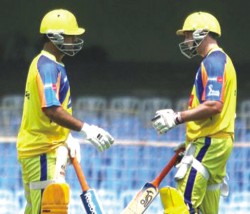Sport
Out-shoring Raises Storm
Coomi Kapoor
 It isn't always easy to keep politics out of sport. With politicians controlling a majority of sporting bodies, from hockey and wrestling to football and cricket, it is hard to keep the two separate, anyway. But very often the conflation of politics and sport can prove unwholesome, as is borne out by the recent decision to out-shore the popular Indian Premier League (IPL) to South Africa. It isn't always easy to keep politics out of sport. With politicians controlling a majority of sporting bodies, from hockey and wrestling to football and cricket, it is hard to keep the two separate, anyway. But very often the conflation of politics and sport can prove unwholesome, as is borne out by the recent decision to out-shore the popular Indian Premier League (IPL) to South Africa.
The transfer to South Africa of the Twenty20 cricket tournament was preceded by a huge controversy. The IPL organisers had already announced the 59-match, five-week itinerary for the second year, held the auction of domestic and foreign players, and sold the telecast rights, while the eight franchise teams had arranged their own individual sponsors.
The pajama cricket extravaganza, beginning in mid-April, was to criss-cross the entire country with matches scheduled for major metro centres and a number of newly-constructed stadiums in smaller satellite towns. Then the Union Home Ministry stepped in. Alarmed by the terrorist attack in Lahore on the visiting Sri Lankan cricketers, Home Minister P. Chidambaram sought a complete re-drawing of the IPL schedule in view of the on-going campaign for the parliamentary election.
The minister argued that providing foolproof security during the election would not be possible. IPL bosses tinkered with the schedule to ensure that there was a clear gap of 48 hours between a match at a particular venue and the polling in that centre.
But there was a deficit of trust between the IPL bosses and the Home Ministry. Senior UPA Minister Sharad Pawar, the vice-chairman of the International Cricket Council, and a senior functionary of the Board of Control for Cricket in India, was all for going ahead with IPL-II with minor changes in the schedule.
Now, Chidambaram cited reports from various Congress governments in states pleading their inability to provide security to IPL matches during the on-going election campaign. However, the IPL schedule could not be altered since the international cricket calendar was already drawn up with the World Cup Twenty20 due to begin in England in June.
Given the presence of a large number of international players in the IPL teams, the only option was to cancel IPL-II. Each of the eight franchisee teams had already spent US$3bil to US$4bil (RM10bil-14bil) on payments to players, publicity, managers, coaches, ground development, etc.
Each franchisee had a 10-year contract with the IPL, with the cheapest team, Rajasthan Royals, committed to pay US$67mil (RM241mil) and the costliest, Mumbai Indians, US$112mil (RM403mil). Each team was also free to spend a maximum of US$7mil (RM25mil) on players' fees. In other words, the cancellation of the IPL would have virtually bankrupted the franchisees.
As it is, all of them had incurred losses in the first year, though actor Shah Rukh Khan's Kolkata Knight Riders was said to have broken even due to his own star power and the resulting higher sponsorship fees. In an aside, the Kolkata Knight Riders was obliged to beat a hasty retreat when the proposal to replace Sourav Ganguly as captain invited angry protests in Bengal.
It is then that IPL's go-getter Commissioner, Lalit Modi, came up with an alternative: offshore the tournament. And soon the cricketing bodies of both England and South Africa were competing to host the pioneering Twenty20 tournament. South Africa won over England because of lower fees, though both distance and the presence of local fans of Indian origin dictated that England would have been a better bet.
Expectedly, the outsourcing of the IPL turned into a political controversy, with the opposition criticising the government for failing to provide security to a popular sporting event. Critics said the real reason for not allowing IPL to be staged was political. Aside from Pawar, the IPL commissioner, Modi, was associated with the former BJP chief minister of Rajasthan, Vasundhra Raje, while the Delhi Cricket Association was led by senior BJP leader Arun Jaitley.
Besides, it was alleged that the IPL's fate was sealed when it turned down the Congress Party's request for commercial time during the match telecasts for its election ads. The IPL ruled out any political advertising during match telecasts. Come April 18, IPL-II will kick off in faraway South Africa.
Opposition political parties were quick to cash in on the out-shoring of IPL. A BJP ditty asks, “if Australian Open is held in Australia, if the French Open is held in France, why is Indian Premier League not held in India…” A popular Internet joke makes the same point thus: Hold the IPL in India, offshore the election to South Africa.
This article was first published in The Star, Malaysia.
Copyright
(R) thedailystar.net 2009 |
